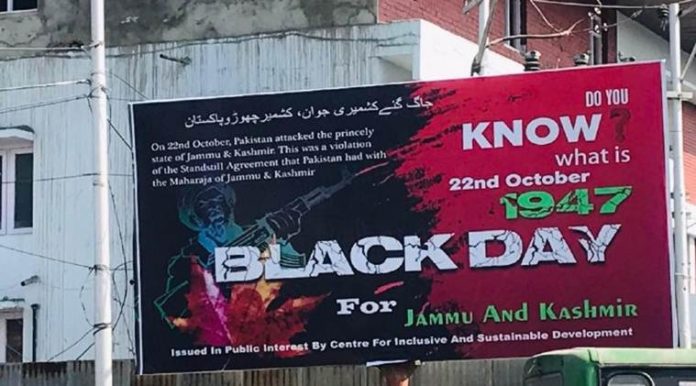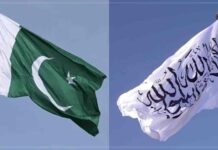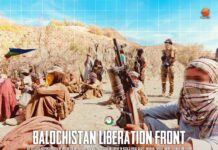Srinagar (NVI): Big hoardings, with messages like ‘Black Day for Jammu and Kashmir’, were put up at several places in Kashmir to mark the anniversary of Pakistani invasion of Jammu and Kashmir on this day in 1947.
While in Kashmir, the anniversary was marked in such a fashion, the occasion saw protests and demonstrations against Pakistan at several places, including Pakistan-occupied Jammu and Kashmir and Gilgit-Balistan as well as foreign cities like London.
It was on this day in 1947 when Pakistani tribals, armed and backed by Pakistani army, invaded Jammu and Kashmir under ‘Operation Gulmarg’ with the motive of merging it forcibly with Pakistan against the wishes of the princely state. It resulted in a war between India and Pakistan but a ceasefire called for by the United Nations divided the state and ensured that Pakistan remained in illegal control of parts of J&K.
To present the correct narrative about the entire issue, a symposium has been organised in Srinagar titled ‘Memories of 22 October, 1947’.
This assumes significance as Pakistan and its proxies have been projecting a wrong narrative on the issue. The museum features photos and videos from Baramulla’s Mission Hospital where many had taken refuge during the invasion but were not spared. The raiders killed even the nurses who were attending on patients there.
According to estimates, about 40,000 people were killed by the Pakistani forces during the invasion, while many non-Muslim women were raped or abducted. The raiders also indulged in mass looting and destruction.
Retired Pakistan Army Major General Akbar Khan, who was involved in the operation, has documented how it was planned and executed. He has mentioned in a book how the Pakistan Army mobilised tribals (afradis), armed them and guided their operation to annex Jammu and Kashmir, before joining them formally.








